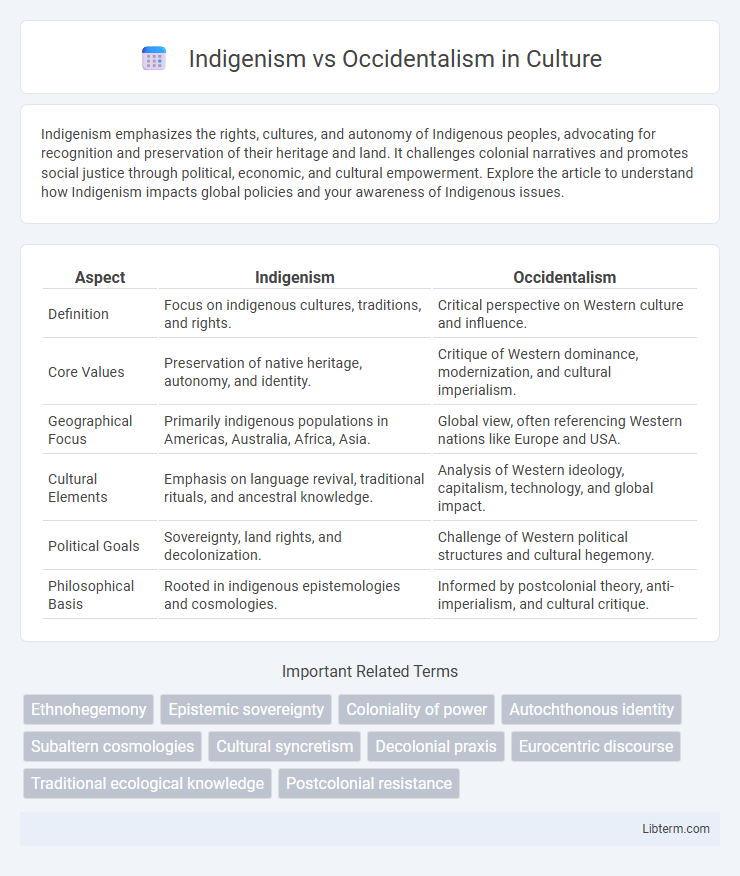Indigenism emphasizes the rights, cultures, and autonomy of Indigenous peoples, advocating for recognition and preservation of their heritage and land. It challenges colonial narratives and promotes social justice through political, economic, and cultural empowerment. Explore the article to understand how Indigenism impacts global policies and your awareness of Indigenous issues.
Table of Comparison
| Aspect | Indigenism | Occidentalism |
|---|---|---|
| Definition | Focus on indigenous cultures, traditions, and rights. | Critical perspective on Western culture and influence. |
| Core Values | Preservation of native heritage, autonomy, and identity. | Critique of Western dominance, modernization, and cultural imperialism. |
| Geographical Focus | Primarily indigenous populations in Americas, Australia, Africa, Asia. | Global view, often referencing Western nations like Europe and USA. |
| Cultural Elements | Emphasis on language revival, traditional rituals, and ancestral knowledge. | Analysis of Western ideology, capitalism, technology, and global impact. |
| Political Goals | Sovereignty, land rights, and decolonization. | Challenge of Western political structures and cultural hegemony. |
| Philosophical Basis | Rooted in indigenous epistemologies and cosmologies. | Informed by postcolonial theory, anti-imperialism, and cultural critique. |
Understanding Indigenism: Core Concepts
Indigenism centers on valuing and preserving indigenous cultures, emphasizing self-determination, traditional knowledge, and ancestral land rights. It critiques colonial histories and modern state policies that marginalize indigenous peoples, promoting cultural revitalization and political sovereignty. Core concepts include decolonization, cultural identity affirmation, and the defense of indigenous epistemologies against Western-centric frameworks.
Defining Occidentalism in Modern Contexts
Occidentalism in modern contexts refers to the critical perspectives and stereotypes about the Western world, often framing it as a symbol of colonialism, capitalism, and cultural hegemony. It challenges Western dominance by highlighting historical exploitation and cultural disruption caused by imperialism. This discourse is prevalent in postcolonial studies, sociopolitical critiques, and cultural debates that seek to reclaim non-Western identities and narratives.
Historical Roots of Indigenism and Occidentalism
Indigenism is rooted in the historical resistance of Indigenous peoples against colonial domination, emphasizing the preservation and revitalization of native cultures, languages, and land rights, often tracing back to pre-colonial civilizations. Occidentalism emerged as a critical response to Western imperialism and modernization, framing Western values, institutions, and cultural dominance as external threats that disrupt indigenous worldviews, influenced by anti-colonial movements and postcolonial theory. Both frameworks evolved through historical encounters between Indigenous societies and European colonial powers, shaping contemporary debates about identity, sovereignty, and the legacies of imperialism.
Cultural Identity in Indigenist and Occidentalist Discourses
Indigenism emphasizes the reclamation and preservation of Indigenous cultural identity through the affirmation of traditional languages, customs, and spiritual practices, serving as resistance to colonial legacies. Occidentalism critiques Western cultural dominance by portraying it as homogenizing and imperialistic, often advocating for a revival or valorization of non-Western identities. Both discourses engage in complex negotiations of cultural identity, positioning heritage and sovereignty at the core of their ideological frameworks.
Political Implications: Indigenism vs Occidentalism
Indigenism promotes political autonomy and cultural revival for native populations, often challenging the dominance of Western political structures and advocating for decentralized governance and land rights. Occidentalism counters with a critique of non-Western or indigenous political systems, sometimes reinforcing Western interventionist policies under the guise of modernization or democracy promotion. The political implications of this tension manifest in struggles over sovereignty, resource control, and the legitimacy of governance models in post-colonial societies.
Knowledge Systems: Indigenous Wisdom vs Western Thought
Indigenous knowledge systems emphasize holistic understanding, interconnectedness with nature, and oral traditions, reflecting a deep-rooted respect for ecosystems and community values. Western thought prioritizes empirical evidence, analytical reasoning, and compartmentalized disciplines, often favoring technological advancement and individualism. The contrast underscores differing paradigms in epistemology, where Indigenous wisdom integrates spirituality and lived experience, while Occidentalism centers on scientific methodologies and objective inquiry.
Representation in Media and Literature
Indigenism emphasizes authentic representation of indigenous cultures, highlighting their traditions, languages, and perspectives often marginalized in mainstream media and literature. Occidentalism critiques Western-centric narratives by exposing biases and stereotypes perpetuated in global media, challenging the dominance of Western cultural hegemony. Representation in media and literature becomes a battleground where Indigenism seeks cultural reclamation while Occidentalism calls for decolonizing storytelling frameworks to foster diverse and equitable voices.
Land, Resource Rights, and Sovereignty
Indigenism asserts the inherent land rights and sovereignty of indigenous peoples, emphasizing restorative justice for historical dispossession and control over natural resources integral to their cultural survival. Occidentalism critiques Western-centric governance models that prioritize state sovereignty and capitalist resource exploitation, often marginalizing indigenous claims and reinforcing colonial legacies. The clash centers on divergent paradigms: Indigenism demands recognition of indigenous legal frameworks and territorial autonomy, while Occidentalism upholds the sovereignty of nation-states and their exclusive rights to resource management.
Challenges of Reconciliation and Decolonization
Indigenism emphasizes reclaiming indigenous identity and sovereignty, while Occidentalism critiques Western dominance and cultural imperialism, creating complex challenges for reconciliation and decolonization efforts. Balancing respect for indigenous traditions with the need to engage in global systems often leads to tensions in policy-making and cultural recognition. Effective decolonization requires addressing historical injustices, restoring indigenous land rights, and fostering mutual understanding without perpetuating new forms of exclusion.
Future Perspectives: Bridging Indigenism and Occidentalism
Future perspectives on bridging Indigenism and Occidentalism emphasize the integration of indigenous knowledge systems with Western scientific paradigms to foster sustainable development and cultural resilience. Collaborative frameworks that honor indigenous epistemologies while embracing technological innovation can create inclusive policies addressing global challenges such as climate change and social justice. Emphasizing mutual respect and intercultural dialogue opens pathways for transformative partnerships that reshape power dynamics and promote equitable futures.
Indigenism Infographic

 libterm.com
libterm.com